Settle in, because this will be long. The results for the AAR 2006 Annual Reader Poll were announced yesterday (see them here), with an analysis presented here, in the accompanying ATBF column.
So now that the results are out, here's my ballot, together with my thoughts on the books that actually won. I haven't actually provided links to my reviews for the books I voted for (I wanted to post today, not next week! *g*), but if you'd like to read them, you'll find the links here.
Best Romance My vote: Slave to Sensation, by Nalini Singh This one was a hard category to vote in, not because I had any doubts of which book I'd go with, but because 2006 was such a good year for me that there were other really excellent candidates. Books like Lord Perfect, by Loretta Chase, Two Little Lies, by Liz Carlyle, The Silver Rose, by Susan Carroll, The Rules of Seduction, by Madeline Hunter... all would have easily been the best in some earlier years. They just had the bad luck of being published in 2006.
Winner: Lover Awakened, by J.R. Ward Well, can't say I'm surprised. I loved this book myself, but I was too conscious of the flaws (and the cheese) for it to be seriously in the running. Plus, even if I'd ignored this and had gone purely with enjoyment, I did enjoy STS better anyway.
Favorite Funny Romance My vote: Lord Perfect, by Loretta Chase Olivia's letters, Benedict's inner thoughts... Witty and brilliant!
Winner: Lord Perfect, by Loretta Chase Yay! Obviously, I agree completely, and it's one first point for me.
Most-Hanky Romance My vote: Left it blank I just can't think of any book that was particularly affecting that way. None that got me at all close to crying, at any rate.
Winner: Lover Awakened, by J.R. Ward Yeah, well, I guess. It did give me that knot-in-my-throat feeling a few times, and I suppose that might count for "Most-hanky". I tend to think "sad" for this category, but I accept that it's not necessarily so for many people. BTW, the honourable mention, which is Simply Love, by Balogh, was almost my choice, but it didn't feel completely right, either.
Most Luscious Love Story My vote: Lover Awakened, by J.R. Ward Truly luscious, even more than my runner-up in this category, Prince of Ice, by Emma Holly.
Winner: The Raven Prince, by Elizabeth Hoyt Oh, come on! It wins in the categories I don't vote for it but not where I do choose it? *g* TRP *was*, indeed, very luscious, but it just can't compare to LA, IMO. And honourable mention Devil in Winter? No way.
Best Erotic Romance My vote: Off World, by Stephanie Vaughan Vaughan is one of my two favourite ebook authors (Lisa Marie Rice would be the second), and I love her erotic romances.
Winner: All U Can Eat, by Emma Holly Good choice, too. In fact, I was pretty sure one of the two Hollys, either this one or Prince of Ice, would win here. The day an e-book wins a category in this poll, we'll know they've gone mainstream.
Most Tortured Romance Hero My vote: Zsadist, from Lover Awakened, by J.R. Ward Can't really get any more tortured than that, but Simon Aristide, from The Silver Rose, by Susan Carroll was also a contender.
Winner: Zsadist, from Lover Awakened, by J.R. Ward No surprise here, and that's 2 points for Rosario.
Strongest Romance Heroine My vote: Maxine Blake, from Sexy/Dangerous, by Beverly Jenkins I adored Max. Hands down the strongest heroine I've read in years. She rivals Eve Dallas in that respect.
Winner: Bella, from Lover Awakened, by J.R. Ward WTF? Bella as strongest heroine? That's just wrong!
Best Romance Hero My vote: Zsadist, from Lover Awakened, by J.R. Ward It was hard to decide between Z and Benedict Carsington, from Chase's Lord Perfect.
Winner: Sebastian St. Vincent, from Devil in Winter, by Lisa Kleypas Eh, well, maybe taking DIW on its own. What bothered me was the personality change from the previous book.
Best Romance Heroine My vote: Maxine Blake, from Sexy/Dangerous, by Beverly Jenkins Have I mentioned I loved Max?
Winner: Evie Jenner, from Devil in Winter, by Lisa Kleypas This one I just can't understand. She was all right, I guess, but not particularly unforgettable.
Best Romance Couple (names, title, and author) My vote: Lucas Hunter & Sascha Duncan, from Slave to Sensation, by Nalini Singh You'll notice I voted for neither of them as Best Hero or Best Heroine, but as a couple, they were mucy more than the sum of its parts.
Winner: Bathsheba and Benedict, from Lord Perfect, by Loretta Chase I loved these two, as well.
Best Romance Villain My vote: Davey, from the Circle Trilogy, by Nora Roberts Davey's the creepy child vampire, and what NR did with him was incredible, especially the tiny glimpse of the normal little boy he had once been. He was most scary in Dance of the Gods, the second book of the trilogy.
Winner: Villain from Lover Awakened, by J.R. Ward Maybe I'm the only one who wished those lessers sections were shorter and we could have gone back to Z and Bella.
Most Annoying Lead Character in a Romance My vote: Left it blank No one comes to mind who I found particularly annoying. Or even mildly annoying, really, and I combed through the 2006 books in my spreadsheet.
Winner: Blair Mallory, from Drop Dead Gorgeous, by Linda Howard I haven't read DDG, and I don't think I will, but I kind of liked Blair in the first book. It was Wyatt who got on my nerves, so much that he got my vote here last year.
Best Romance Author Who Debuted in 2006 My vote: Elizabeth Hoyt None of the awkwardness commonly associated with debut books. Hoyt writes like a pro, and I loved her book.
Winner: Elizabeth Hoyt I was pretty sure she'd win here, since there was so much overwhelmingly postive talk about her book late in the year. 3 points for me.
Best Buried Treasure Romance Read My vote: Sexy/Dangerous, by Beverly Jenkins I've tried to post about this book everywhere I go. I think many of us were looking for a book like this one, and it seems a shame that it doesn't get talked about.
Winner: Jacob, by Jacquelyn Frank I haven't read it, but it's in the TBR. Maybe I'll bring it up and see what the fuss is about. And same thing for one of the hon. mentions, The Beauty and the Spy, by Julie Anne Long.
Guiltiest Romance Pleasure My vote: Lover Awakened, by J.R. Ward Ward's books always perfectly fit my definition of guilty pleasure. As I read them, too many sections make me think "This is awful, why am I loving it so much?". Also in the running: The Assignment, by Evangeline Anderson.
Winner: All U Can Eat, Emma Holly Guilt-free sex does seem to make people feel guilty.
Romance Author Most Glommed in 2006 My vote: Nalini Singh Not a BIG glom, as I've done in earlier years, when I tried to collect the backlists of such prolific authors as JAK or Anne Stuart, but I did immediately buy her entire backlist after reading Slave To Sensation.
Winner: J.R. Ward I share LLB's surprise at this result, which she expressed in the ATBF column. I've got all 3 Ward books, with the 4th on the way, and I don't think I'd call it a glom, precisely. It's not just the actual number, but the manner in which I bought them: I bought book 1, read it, waited for book 2, read it, waited for 3, and so on. Glom for me means reading one book and then searching for anything the author has already out. I don't know, I guess it's possible that's how some people read Ward, maybe if they found her late, when all 3 books were already out.
Best Cabin or Road Romance My vote: Lord Perfect, by Loretta Chase A road romance, in this case, and I thought Chase made wonderful use of this.
Winner: Lord Perfect, by Loretta Chase Point # 4. Good win.
Best Medieval/Renaissance Romance : My vote: The Silver Rose, by Susan Carroll Loved, loved, loved this whole series.
Winner: The Silver Rose, by Susan Carroll And point # 5 right after it. Ahhh, this was such a good book.
Best European Historical Romance My vote: Lord Perfect, by Loretta Chase Just edged out the Carlyle and the Hunter. It was just so delightful!
Winner: Devil in Winter, by Lisa Kleypas No, no, no. I mean, I *liked* this book, but it's NOT better than Lord Perfect (which, at least, got an honourable mention). Well, opinions will vary.
Best Amer Hist or Frontier Romance My vote: Left it blank These have never been my favourite settings, and I didn't read even one 2006 book that would fit.
Winner: tie between A Reason To Live, by Maureen McKade and The Rogue's Return, by Jo Beverley. I might try the McKade, I think some of my favourite bloggers liked it, too.
Best Contemporary Romance My vote: Angels Fall, by Nora Roberts I always have a problem differentiating between Contemporary Romance and Romantic Suspense. As far as I'm concerned, "Contemporary" is simply a time setting, while "Romantic Suspense" refers to a type of romance. So I ended up voting for a RS title that happened to be set in the present. Otherwise, this would have been left blank, because the only "plain" contemporary-set single title that I read sucked.
Winner: Drop Dead Gorgeous, by Linda Howard Yep, haven't read it. At least mine got an honourable mention. And LOL, the other mention is for Sex, Lies and Online Dating, which you'll see mentioned below. You'll see why I'm laughing.
Best Series/Category Book My vote: Left it blank I read only one, Mistress for a Weekend, by Susan Napier, and though it was all right, it wasn't good enough for me to feel comfortable voting for it.
Winner: Family at Stake, by Molly O'Keefe I think I actually put it on my wish list after reading the review at AAR.
Best Romantic Suspense My vote: Angels Fall, by Nora Roberts There were other good books in this category, even one of last year's In Death titles, which got the same grade as Angels Fall, but AF won by a hair.
Winner: Cold as Ice, by Anne Stuart Would you believe I still haven't got to this one? I will, I will, soon. Again, my choice got honourable mention.
Best Alternate Reality Romance My vote: Slave to Sensation, by Nalini Singh STS was the best book I read last year. STS belongs to the "Alt. Reality romance" category. Therefore, it's the best "Alt. Reality romance" I read last year. No ifs or buts.
Winner: Lover Awakened, by J.R. Ward The other voters applied the same logic. Makes sense.
Best Chick Lit/Women's Fiction My vote: The Manolo Matrix, by Julie Kenner Only 2006 one I read, but I loved it, so I'm comfortable voting for it.
Winner: Hot Dish, by Connie Brockway Haven't read it yet, but it's interesting to see it in this category, not in Contemp. Romance. It's coherent with all I've heard.
Best Romance Short Story My vote: Haunted in Death, by J.D. Robb, from Bump in the Night anthology Best of the In Death short stories so far, IMO.
Winner: Hot Toy, by Jennifer Crusie, from Santa, Baby anthology Hey, I'd forgotten this one had come out. I meant to get it, off to amazon I go.
Romance Author You Gave Up On in 2006 My vote: Anne Gracie I LOVED an earlier book, but her latest.... Blergh
Winner: Christina Dodd Gave up on her years ago. Never much liked her books, really.
Most Disappointing Romance My vote: One Good Knight, by Mercedes Lackey First things first: disappointing doesn't necessarily mean bad, just not as good as I'd hoped for. And unfortunately, there were a few last year. One Good Knight was nice enough, but I was very disappointed in the YA-ish feel and the lack of protagonism of the Tradition. Also in the running: The Devil in Winter, by Lisa Kleypas and One Forbidden Evening, by Jo Goodman, but OGK "won" because I'd loved The Fairy Godmother so much.
Winner: On the Way To the Wedding, by Julia Quinn Haven't read it yet, but it's not a surprise. I've been hearing a lot of comments along this line, maybe the reason why it's still languishing on the TBR.
Worst Romance My vote: Left it blank Due to the way I buy my books, I guess I don't take many chances when it comes to new releases. If I'm going to go through the expense and trouble of buying a new book, it's going to be one by a proven author or one that got excellent buzz online. Which means I don't usually miss. The worst 2006 book I read last year was Sex, Lies and Online Dating, by Rachel Gibson, and it was only a C+, really not bad enough to merit a vote here.
Winner: On the Way To the Wedding, by Julia Quinn As I said, I haven't read it, but really? Did Julia Quinn really write a book that was worse than anything else out there? I'm going to think of this category as "worst book that a lot of people actually read", maybe it will make more sense that way. Plus, I still get the feeling some people don't see the difference between disappointing and bad.
Purplest Prose Romance My vote: One Forbidden Evening, by Jo Goodman I know many people love her writing, but for me, it crosses the line between lush and purple. YMMV, of course.
Winner: Prince of Ice, by Emma Holly Weeeell, I guess so, maybe. Didn't particularly bother me, though.
Phew, that's it. So, what did you think?
Read more...
Jennifer had taken drastic measures to become pregnant, and she was saving every ounce of love she had for her baby. There was no room in her life for marriage--but now the father of her unborn child had arrived on her doorstep!
 A Splendid Opportunity
A Splendid Opportunity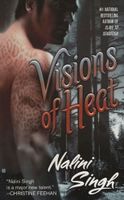 The VISIONS OF HEAT meme
The VISIONS OF HEAT meme Who was that masked man...?
Who was that masked man...? 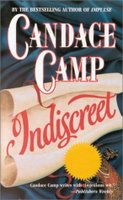
 Two hundred years ago, in order to keep the peace in Samaria, the god Jovah created a legion of land-dwelling angels, led by an appointed Archangel. Now, Jovah has a new appointee: Archangel Gaaron. And for his life-mate, his Angelica, Jovah has chosen a woman named Susannah. With trepidation, she bows to the will of Jovah and an unspoken affection slowly develops between the two.But there is a terrible threat besetting the land-black-clad strangers who call fire down from the sky, leaving death and destruction in their wake. And the true hearts of Archangel and Angelica may never be known, as the future of the planet hangs in the balance...
Two hundred years ago, in order to keep the peace in Samaria, the god Jovah created a legion of land-dwelling angels, led by an appointed Archangel. Now, Jovah has a new appointee: Archangel Gaaron. And for his life-mate, his Angelica, Jovah has chosen a woman named Susannah. With trepidation, she bows to the will of Jovah and an unspoken affection slowly develops between the two.But there is a terrible threat besetting the land-black-clad strangers who call fire down from the sky, leaving death and destruction in their wake. And the true hearts of Archangel and Angelica may never be known, as the future of the planet hangs in the balance... 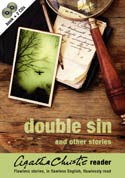
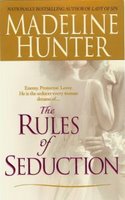 His rules will teach her the most sensual seductions and pleasures.
His rules will teach her the most sensual seductions and pleasures.
 His name, they tell him, is William Monk, and he is a London police detective. But the accident that felled him has left him with only half a life; his memory and his entire past have vanished.
His name, they tell him, is William Monk, and he is a London police detective. But the accident that felled him has left him with only half a life; his memory and his entire past have vanished. 
 Justin St. John would always remember the day his little pixie had ridden up to Worth Hall, her limpid eyes as big as saucers. But nothing could have prepared him to see Clare again, grown-up, beautiful…and nearly betrothed to a madman! He couldn’t just sit back and watch the innocent Clare ruin her life….
Justin St. John would always remember the day his little pixie had ridden up to Worth Hall, her limpid eyes as big as saucers. But nothing could have prepared him to see Clare again, grown-up, beautiful…and nearly betrothed to a madman! He couldn’t just sit back and watch the innocent Clare ruin her life….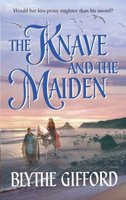 COULD A MAIDEN'S KISS TURN A CYNICAL ROGUE INTO AN HONORABLE KNIGHT?
COULD A MAIDEN'S KISS TURN A CYNICAL ROGUE INTO AN HONORABLE KNIGHT? 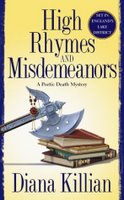 Can a love of dead poets save her from following in their footsteps?
Can a love of dead poets save her from following in their footsteps? A wife shouldn't be a surprise package.
A wife shouldn't be a surprise package. After the brutal murder of her husband, police officer Liz Rivas entered the witness protection program to save her young son. Today, twenty years later, she's Jenna MacArthur, shop owner in Pfister, Missouri. Jenna and her son, Sam, a rookie cop, have build new lives in a small town where everybody knows everybody's business. Or at least they think they do.
After the brutal murder of her husband, police officer Liz Rivas entered the witness protection program to save her young son. Today, twenty years later, she's Jenna MacArthur, shop owner in Pfister, Missouri. Jenna and her son, Sam, a rookie cop, have build new lives in a small town where everybody knows everybody's business. Or at least they think they do.








